How to better organize your life
Last updated on: December 7, 2021
I bet everyone can name at least 3 benefits of being organized off the top of their head (mine are: reduced stress, increased productivity, having time for everything). Yet, not many people are living an organized life — the majority just don’t know how or where to start.
As the popular productivity YouTuber, Lavendaire said, “being organized and productive is not about doing more but getting more use out of your time”.
In this article, we’ll show you the perks of better organizing your life. Then, we’ll go over skills and habits you need to develop to become more organized, how to declutter and simplify, how to always be prepared, and what apps will help you organize your life better.
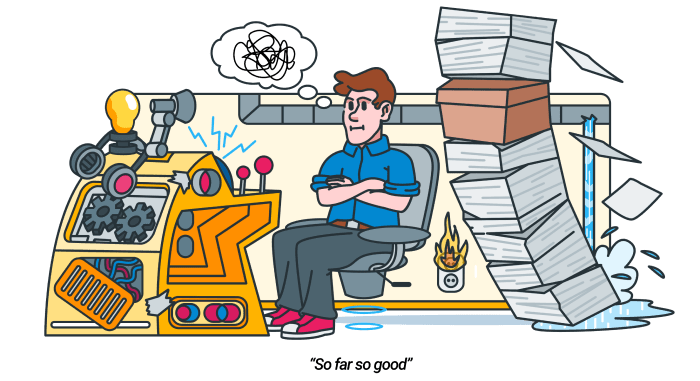
Table of Contents
The benefits of better organizing your life
Having enough time for work, family and friends, workouts, and doing everything you want to — if this seems like a mission impossible to you, don’t stress out. The key to having it all is simple — better organization. Once you learn how to better organize your life, you’ll have time for anything you want to do. But, here are some other benefits of organizing your life properly.
Being organized will help you manage your time better
One of the most crucial traits of organized people is that they know what they have to do and when, plus how much time they need to do it.
If you know what you have to do, but you’re not sure how long this task will take you, you should do what organized people do — track the time you spend on your daily activities.
Thus, you’ll gain a clearer understanding of what your day looks like and whether you need to change some habits.
So, being able to organize your tasks and activities will help you manage your time more effectively. But, apart from assignments, organized people take good care of their space as well. That means getting rid of any clutter and keeping everything at its designated place. Therefore, being organized will save you from wasting minutes or hours trying to find your wallet in the morning.
Being organized will improve your productivity
As we already mentioned, when you’re organized, you manage your time better, and thus, you’re able to complete your tasks and activities on time. This way, being organized also boosts your productivity levels.
Think about it: as an organized person, you have good time management skills, which allow you to plan your day or a week. After some time (and practice), you strive to achieve more by using the same resource (your time), which is the essence of productivity. For instance, if you noticed that you need 30 minutes, instead of an hour, to finish your grocery shopping, you have half an hour left for another quick errand to run.
So, managing your time the right way goes hand in hand with improving your productivity levels, which are both qualities of organized people.
Being organized will make you more energized
Another benefit of better organizing your life is being more energized. Once you learn how to manage your time properly — which improves your productivity — a lucky consequence is that you’ll feel energized and empowered.
As you can imagine, feeling energized will boost your mood. Apart from that, when you’re empowered, you’ll be able to deal with complicated tasks or activities more effectively.
—
Now that we’ve seen the key perks of being organized, we bet you’re eager to discover how exactly you can become such a person.
The principles for organizing your life better
Are you ready to master your organizational abilities?
If so, keep your pen and paper nearby, as you may want to note down the following tips for organizing your life better:
- develop skills for better organization,
- build good (and realistic) habits,
- declutter and simplify,
- be prepared, and
- use the right apps.
Develop skills for better organization
The most important skills for good organization are time and money management and good, efficient communication.
Get better at time management
Organized people know how important it is to work smarter, not harder, which is why time management is crucial. There is always room for improvement, so here are a few tips:
- Set goals. Your goals should be SMART: specific, measurable, attainable, relevant, and timely. It’s easier to stay organized when you know why you’re doing it.
- Prioritize. Divide your daily tasks by how important they are and do them in order of their priority level: most important and urgent tasks should be done first.
- Batch similar tasks together. Whenever you switch to a task different from the one you were doing, your brain needs some time to adjust to a different type of thinking and a different perspective. When you batch similar tasks together, you don’t lose as much of your focus.
- Avoid multitasking. Concentrate on one task at a time and you’ll be much more efficient.
- Double-check the time of meetings and the deadlines. Just trust me on this one.
- Set a time limit to complete a task. Keep in mind that the amount of time required to complete a task is the amount of time you give yourself, which is the essence of Parkinson’s law. If you give yourself 2 weeks to finish it, it’ll take 2 weeks. If you give yourself 3 days, it’ll take 3 days.
- Track your time. It will keep you accountable and help you to organize your time better and to avoid distractions.
💡 Do you want to learn more about the benefits of time tracking? These two articles explain it in more depth:
Learn to communicate effectively
Being a good communicator is essential if you aspire to have an organized life. Effective communication consists of:
- Being a good, engaged listener
- Making effort to get your point across as clearly as possible
- Being aware of the importance of non-verbal communication (tone of voice, body language, facial expressions, gestures, etc.)
- Being focused on the conversation and minimizing distractions
- Not interrupting the person you’re talking with and encouraging them to speak freely
- If there’s anything unclear, address it as soon as possible to avoid any misunderstandings
- Being assertive but tactful and respectful
Learn to manage your finances better
Do you know how to manage your money? That’s a skill everyone should have, regardless of what you do for a living or the amount of money you have in your bank account. Here are some tips that can help you:
- Have a monthly budget and plan in advance how much money you are going to spend on each category (bills, food, transportation, entertainment, savings, etc). Do your absolute best to stick to that plan.
- Keep track of your bills and the date you paid them. You can also automate bill payments.
- Track your spending. See where your money goes and if there are expenses you can minimize or completely cut off.
- Save a percentage of every paycheck. According to some experts, you should save 20-30% of your monthly income, but find out what works for you. It’s also a good idea to have a separate savings account.
- Don’t look at your credit card as free money. Pay off credit card debt as soon as possible and take care of your credit score.
- If you are in more than one debt, the one with the highest interest rate should be paid the fastest.
Build good (and realistic) habits
The key to being organized is developing good habits — but those good habits need to be realistic as well, or you won’t be consistent with them.
It’s not very likely that you’ll all of sudden start waking up at 5 a.m. (even though your bedtime of choice is 1 a.m.), read for an hour, and then work for 10 hours, especially if you’re naturally more productive at night and prefer listening to audiobooks over reading.
Make sure to find out what works for you, your lifestyle, and your inclinations; then make a routine around it.
Learn to eat the frog (do the hardest task first)
My mum used to say this to me when I was a kid; she started as soon as she thought I was old enough to realize that I won’t have to literally eat frogs.
“If you have to eat the frog, eat it in one bite and then continue with your day. The more you hesitate to do it, the harder it will be”, she would tell me.
If you need to do something hard and/or important, especially if you dread it, do it first, within the first few hours of your workday. It will give you a sense of accomplishment and provide the wind at your back to help you continue your day successfully.
💡 If you’re interested in the Eat the Frog technique, you should check out this great article!
Live healthy(ish)
You need to take care of yourself to function properly.
Eat nutritious, preferably home-cooked meals, have some kind of physical activity at least 3 times a week, and have a regular sleep schedule.
Being healthy doesn’t mean that you can’t eat chocolate or have a glass of wine; making healthy choices 80% of the time is completely fine. If you start feeling guilty for eating or not working out and it takes a toll on your mental health, it’s not healthy anymore.
Taking care of your mental health is a part of a healthy lifestyle: practice mindfulness, spend time with the people you love, have some alone time, enjoy your hobbies. Life is not just about work and productivity and you should try your best to find a good work-life balance and live a quality life.
Take time to relax
Rest is as important as working.
Just like a muscle, your brain gets worn out and it needs downtime to function properly.
You don’t have to work 24/7 to be productive. In fact, you’ll be much more productive if you take proper rest.
Not only that: if you sacrifice sleep to get more work done, be aware that being sleep deprived makes you more prone to serious illnesses such as diabetes, high blood pressure, and heart disease, among others.
Some people schedule their time to relax in advance: if you’re super busy, that’s an idea you should try out.
Shop mindfully
It’s not easy to shop consciously in the consumerist society we live in. We’re constantly bombarded by all the new things we need and must have.
However, we can all benefit from shopping mindfully and not participating in excessive consumerism. Your wallet will thank you, planet Earth will thank you, even the future will thank you when it comes the time to clean the closet.
Before you buy something, ask yourself: Can I truly afford this? Would I still wish for it if it wasn’t on sale? How often will I use it? Will I still use it in 5 years? Do I already own something similar?
Clean a little bit every day
I know cleaning every day sounds horrible, but hear me out. Set a timer for 15 or 20 minutes and clean as much as you can in that timeframe. If you feel like it, you can continue cleaning after the timer goes off, but you don’t have to. You can focus on a different room every day. Your space will always look if not great, then at least acceptable without you putting in a lot of effort.
In regards to that, make sure everything you own has its home, to eliminate clutter. If you always put everything in its place after use, your space will be tidy and you won’t have to worry about being late to work because you have no idea where your car keys are.
Declutter and simplify
You can’t have a clear and organized mind in a cluttered and non-organized space.
In her book, The Life-Changing Magic of Tidying Up, Marie Kondo said “The space in which we live should be for the person we are becoming now, not for the person we were in the past”.
She adds: “The best way to choose what to keep and what to throw away is to take each item in one’s hand and ask: “Does this spark joy?” If it does, keep it. If not, dispose of it.”
This principle applies to everything: not only your physical space but also your digital space and who and what you surround yourself with.
Write everything down
To declutter your mental space, write things down.
If I had to choose only one tip to take away from this article, I would personally choose this one. I write everything down, from to-dos and shopping lists to deadlines and birthdays. Every idea I randomly get and any concept I find interesting also end up written down. I don’t like keeping things in my head because 1) I don’t have the best memory and 2) knowing that I might have forgotten something makes me anxious.
Writing has many benefits: it helps me clear my head, remember things better, and it saves my mental energy. It also prevents me from feeling overwhelmed.
It’s very hard (we could argue that it’s almost impossible) to forget something when you keep seeing it in your planner, in the calendar on your phone, and on a post-it note next to your desk.
Declutter your digital space
Just like a psychical space, your digital space needs to be decluttered from time to time.
- Go through your gallery and delete blurry or accidentally shot photos, screenshots you don’t need anymore, photos you look bad in, or anything else you don’t need to keep.
- Go through your documents and see which ones you don’t need anymore. If you originally named them something like “sjsksl” or “jmia<yeq2”, rename them so it will be easier to organize them and/or find the one you need.
- Go through your social media and unfollow people and pages you don’t care for anymore or that don’t add value to your life.
- Go through your email and get your inbox as close to zero as possible. Even more important is to go through the newsletter you get and unsubscribe from the ones you’re not interested in anymore.
- Go through the apps on your phone and delete the ones you’re not using.
- Delete all files and folders on your desktop that you don’t need.
💡 If you need help with decluttering your inbox, check out the tips from Patty Kreamer, a professional organizer.
How to manage email productivity: Tips from Patty Kreamer, a professional organizer
Cut down your to-do lists
You don’t need 30 tasks on your to-do list.
If you get good at prioritizing, your life will become significantly easier.
- Choose up to 3 things you absolutely need to get done and mark them as a priority.
- Then, write a couple of things you can do when you finish the top 3.
- Consider delegating some of those secondary tasks.
- Focus on getting the top 3 done, and if you manage to do the other ones too, great! But if you don’t, it’s okay because you finished the most important tasks of the day.
Another technique you can try out is a little unusual, but it works for some people — write down and cross off a task only after you accomplished it. It gives you the satisfaction of crossing off (and hence, finishing) something, and it motivates you but it doesn’t add the stress of a barely touched to-do list.
Break down tasks into smaller ones
Did you know that some of the main reasons for procrastination are the fear of failing and feeling overwhelmed?
Big tasks can seem intimidating.
Solve them by breaking them down into chunks. It’ll make you less likely to procrastinate and more likely to stay organized.
Cleaning the whole house sounds complicated and tiring, and you probably don’t want to do it (completely understandable). Break that project into smaller parts, for example, divide the tasks by room. Cleaning the kitchen sounds more doable than cleaning the whole house.
Go step by step.
Doing the dishes sounds even more achievable. That’s just a couple of plates and cups. You can do it.
Be prepared
As Benjamin Franklin said, “By failing to prepare, you’re preparing to fail”. Thinking a few steps ahead will make your future life significantly better.
Plan in advance
Part of being organized is always knowing what you need to do and what your next move is. Taking some time to plan your day, week and month will save you time, energy, and money.
Start by reviewing and analyzing the past couple of months or even the past year. Have you achieved your goals? If you didn’t, why? What can you do better? Is there anything you need to change?
Implement what you’ve learned from this introspection and make a game plan.
Don’t wait for the last minute to make decisions; as John F. Kennedy said, “The time to repair the roof is when the sun is shining”.
Know what distracts you
According to this research, featured in Harvard Business Review, only 26% of people often leave work accomplishing everything they planned to do. The ones to blame for that are interruptions and distractions we come across multiple times a day.
You can’t predict and avoid all of them, but you can be proactive and figure out what usually distracts you, so you can avoid it in the future.
The most common things that interrupt your workflow are phone notifications and talking to your coworkers (or family members if you work from home). The music you listen to while you’re working can be a distraction, so it’s best to opt for something that doesn’t have words, just instrumental.
There’s a technique called distraction list: whenever a distracting thought pops up, write it down. Some thoughts (like “oh, I need to pick up that package today”) deserve attention, just not at the moment. Write them down and get back to work. After you finish, go through the list and see if there’s anything you need to take care of.
Another important thing to consider is that your brain can’t stay focused forever — its attention span has a maximum of 90 minutes in the morning, and, throughout the day, it becomes shorter and shorter. When your mind is tired, it wanders off and searches for a distraction. To prevent that, take regular breaks.
Don’t jam-pack your schedule
Planning is great — but take into account that things don’t always go as planned. As much as a day scheduled to a minute looks good on Google calendar, sometimes life happens. Things get delayed, meetings get prolonged or something unexpected can pop up.
Try to leave some room in your schedule for possible changes of plans and improvisation.
Make backups of everything important
I think the majority of us learned the hard way how crucial this is. (No, I wasn’t able to restore that one paper I spent weeks working on in university. That’s why I have this blog post saved in two separate places.)
If it’s important to you, make a backup. It will save you a lot of stress if something goes wrong, and when I say a lot, I mean a lot.
Use the right apps for organizing your life
There is a wide variety of apps that can make your life easier and help you stay organized. Here are my recommendations:
- Clockify
- Pumble
- Todoist
- Trello
- Google Calendar
- Cold Turkey
- LastPass
Clockify
Clockify is a time tracking app. Time tracking can help you with procrastination, as well as becoming more efficient: you’ll see where exactly your time goes and what are areas you can improve on.
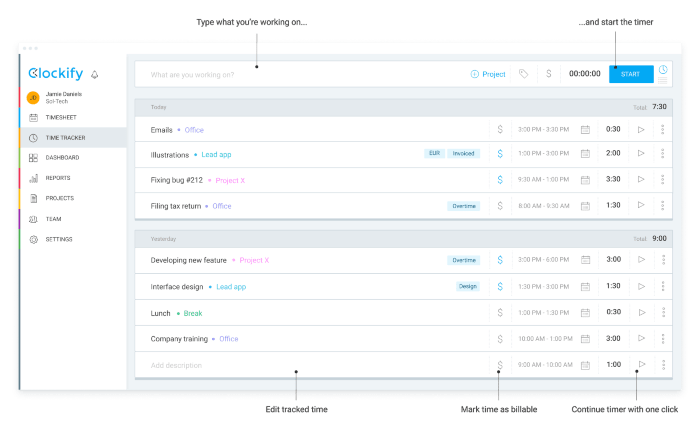
Free | Available for Mac, Linux, Windows, Android, iOS, and as a Chrome, Firefox, and Edge web extension.
Pumble
Pumble is a communication and collaboration app. We already mentioned that communication plays a vital role in your pursuit of becoming an organized person. This tool will help you get in touch with your coworkers and ensure that your conversations are clear and transparent, without any misunderstandings.
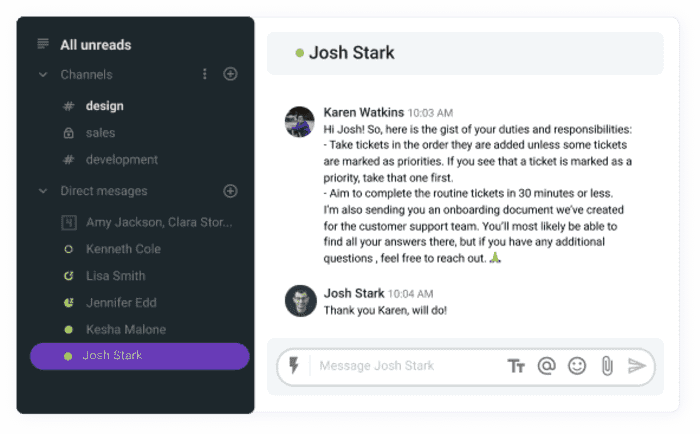
Free | Available for Windows, Mac, Mac (M1), Linux, iOS, Android, web app
Todoist
Todoist is an app that lets you create to-do lists. You can divide tasks into different categories and color code them, as well as set their priority level. The most common categories are Work and Personal, but you can also add a Shopping list, Books to read, and many more.
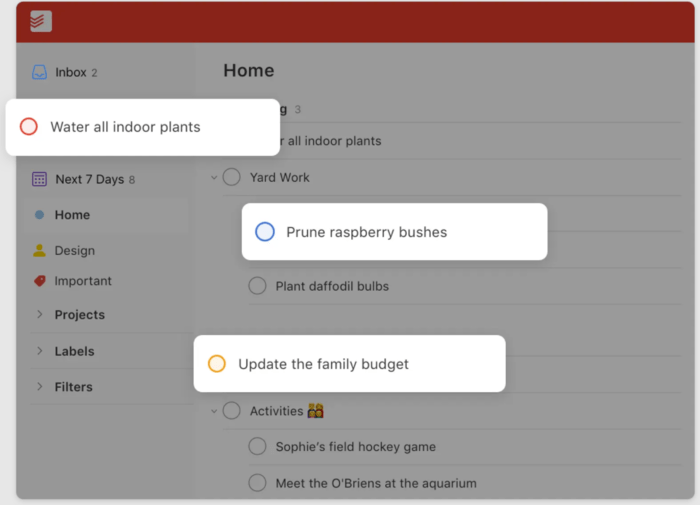
Free | Available for Mac, Windows, Linux, Android, iPhone, iPad, extensions for Chrome, Firefox, Edge and Safari, Apple Watch, Wear OS, Gmail add-on, Gmail extension, and Outlook.
Trello
Trello is a great app if you’re a fan of the Kanban method. It lets you group tasks into categories (usually To do, Doing, and Done), so you can have a clear overview of everything you’re working on or planning to work on.
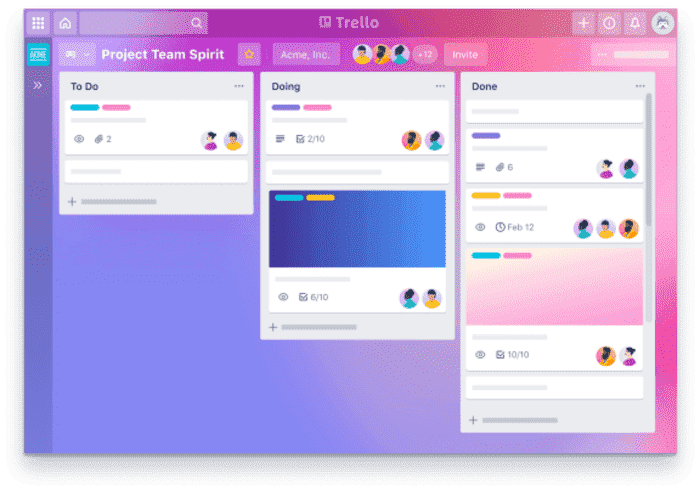
Free | Available for web, macOS, Windows, iOS, Android.
Google Calendar
Google Calendar is a calendar app, great for keeping track of important dates, events, and meetings. You can also time block and set reminders.
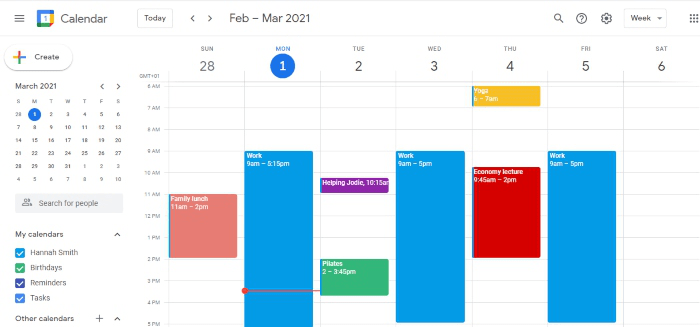
Free | Available for iOS and Android, as well as on the web.
Cold Turkey
Cold Turkey is an app that will help you focus. Set the duration, start the timer, and it will block all distractions. You won’t be able to access them in any way until time’s up.
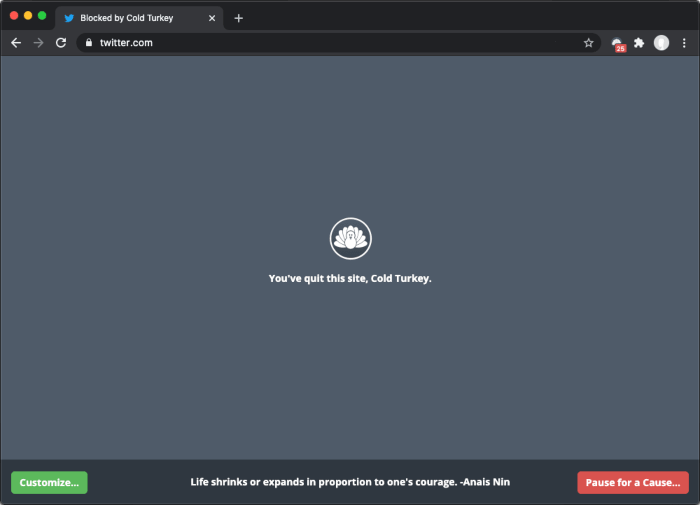
Free, but doesn’t offer many features; the one-time fee for a pro version is $39 | Available for Windows
LastPass
There are two types of people in the world: t̶h̶e̶ ̶o̶n̶e̶s̶ ̶t̶h̶a̶t̶ ̶e̶n̶t̶e̶r̶t̶a̶i̶n̶ ̶a̶n̶d̶ ̶t̶h̶e̶ ̶o̶n̶e̶s̶ ̶t̶h̶a̶t̶ ̶o̶b̶s̶e̶r̶v̶e̶ the ones who have the same 1-3 passwords for everything and the ones who have a different password for every single account they have. If you belong to the latter group, this app will help you store all your passwords.
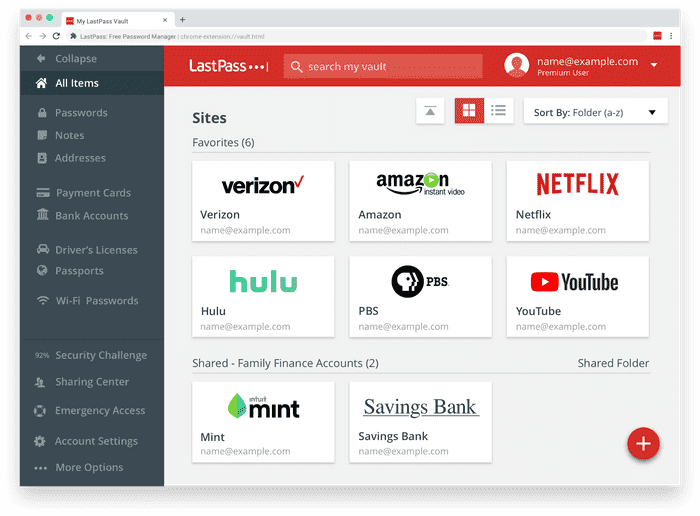
Free | Available for Mac, Windows, Linux, and extensions for Chrome, Firefox, Safari, Opera, and Edge
Conclusion
Organizing your life may seem like a long and complicated journey, but it’s absolutely doable. Key things are building good habits, decluttering, simplifying, and being prepared. There are also a couple of skills you should develop, such as time and money management. You don’t have to do all of that by yourself — there are many apps that will make your life easier.
Being organized will help you make the most out of your time and live your life to its fullest potential because you will have time for everything.
✉️ Do you have tricks that help you better organize your life? What do you think about the tips we covered in this blog post? Write to us at blogfeedback@clockify.me for a chance to be featured in this or future articles.


